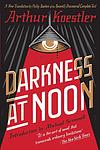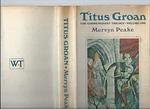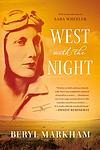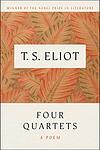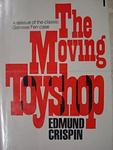The Greatest British Books From 1940 to 1949
Click to learn how this list is calculated.
This list represents a comprehensive and trusted collection of the greatest books. Developed through a specialized algorithm, it brings together 273 'best of' book lists to form a definitive guide to the world's most acclaimed books. For those interested in how these books are chosen, additional details can be found on the rankings page.
Genres
Countries
Date Range
Reading Statistics
Click the button below to see how many of these books you've read!
Download
If you're interested in downloading this list as a CSV file for use in a spreadsheet application, you can easily do so by clicking the button below. Please note that to ensure a manageable file size and faster download, the CSV will include details for only the first 500 books.
Download-
1. Nineteen Eighty Four by George Orwell
Set in a dystopian future, the novel presents a society under the total control of a totalitarian regime, led by the omnipresent Big Brother. The protagonist, a low-ranking member of 'the Party', begins to question the regime and falls in love with a woman, an act of rebellion in a world where independent thought, dissent, and love are prohibited. The novel explores themes of surveillance, censorship, and the manipulation of truth.
-
2. Animal Farm by George Orwell
"Animal Farm" is a satirical fable set on a farm where the animals revolt, overthrow their human farmer, and take over the running of the farm for themselves. The story is an allegory of the Russian Revolution and the rise of Stalin, and the tale is told by the animals that inhabit the farm, primarily pigs who become the ruling class. Despite their initial attempts at creating an equal society, corruption and power ultimately lead to a regime as oppressive as the one they overthrew.
-
3. Under the Volcano by Malcolm Lowry
Set in Mexico on the Day of the Dead in 1938, the novel follows the last day in the life of Geoffrey Firmin, a British consul with a severe alcohol addiction. Through his interactions with his estranged wife and half-brother, the book explores themes of despair, betrayal, and the destructive power of addiction, against the backdrop of political and social unrest. The impending eruption of the nearby volcano serves as a metaphor for Firmin's deteriorating mental state and the looming world war.
-
4. Brideshead Revisited by Evelyn Waugh
The novel is a nostalgic story about the narrator's involvement with the Flyte family, British aristocrats living in a grand mansion called Brideshead. The story explores themes of faith, love, and the decline of the British aristocracy, primarily through the narrator's relationships with the family's Catholic faith and his complicated friendship with the family's son and his love for the daughter. The novel is set in the backdrop of the time period between the two World Wars.
-
5. Darkness at Noon by Arthur Koestler
"Darkness at Noon" is a novel set during the Stalinist purges in Russia in the 1930s. The story follows an old Bolshevik, who is imprisoned and psychologically tortured by the government he helped create. As he reflects on his life and the choices he made, he grapples with the betrayal of his revolutionary ideals and the corruption of the Soviet regime. The narrative provides a profound exploration of the moral danger inherent in a system that is willing to sacrifice the individual for the supposed collective good.
-
6. The Power and the Glory by Graham Greene
The novel is set during the Mexican Revolution, focusing on a whisky priest who is on the run from the authorities who have outlawed Catholicism. The priest, who is flawed and sinful, travels across the country to evade capture, minister to the faithful, and find a way to repent for his sins. Despite his moral failings, the priest's compassion and commitment to his faith make him a symbol of hope and resilience in the face of oppression. The book explores themes of faith, redemption, and the human struggle with sin.
-
7. I Capture the Castle by Dodie Smith
"I Capture the Castle" is a coming-of-age novel that tells the story of 17-year-old Cassandra Mortmain and her eccentric family living in a dilapidated English castle during the 1930s. Cassandra's father is a reclusive writer suffering from writer's block and her stepmother is a bohemian artist. The family's life changes dramatically when two American brothers inherit the estate. The novel, written in diary format, explores themes of love, poverty, and the transition from adolescence to adulthood.
-
8. Loving by Henry Green
"Loving" is a novel set in an Irish castle during World War II, focusing on the lives of the servants who work there. The narrative provides a detailed and intimate exploration of the relationships, gossip, and everyday routines of the domestic staff, while the war remains a distant threat. The book is known for its unique use of language and dialogue, as well as its exploration of class dynamics.
-
9. Titus Groan by Mervyn Peake
The novel is a gothic fantasy set in the bizarre and intricate world of Gormenghast Castle, home to the ancient and eccentric Groan family. The story begins with the birth of Titus Groan, the seventy-seventh Earl, who stands to inherit the castle and its strange traditions. The narrative follows the castle's eccentric characters and their bizarre rituals, including the ambitious kitchen boy, Steerpike, who seeks to manipulate the castle's traditions for his own gain. It's a dark and surreal exploration of ritual, power, and madness.
-
10. Black Lamb and Grey Falcon by Rebecca West
"Black Lamb and Grey Falcon" is a comprehensive and detailed travelogue of Yugoslavia, penned by a British author during the brink of World War II. The book beautifully interweaves history, politics, culture, and personal experiences to paint a vivid picture of the Balkan region. It also serves as a profound reflection on the impending war and the author's concerns about the rise of fascism in Europe, making it not just a travel book but also an essential historical document.
-
11. The Heart of the Matter by Graham Greene
The novel follows the story of a British colonial police officer stationed in Sierra Leone during World War II. He is an honest and diligent man but finds himself in a moral crisis when he is torn between his duty and his love for another woman. He is caught in a spiral of deceit, corruption, and betrayal that leads to his tragic end. The narrative delves into themes of guilt, faith, betrayal, and moral paradoxes.
-
12. The Second World War by Winston Churchill
This book provides a comprehensive overview of the Second World War from the perspective of one of its most influential leaders. It covers the entire span of the war, from its origins in the political and economic turmoil of the 1930s, to the major battles and strategic decisions that shaped its course, to its aftermath and impact on the world. The author's unique perspective and firsthand experience, combined with his eloquent and insightful writing, make this a definitive account of one of the most important events in modern history.
-
13. The Open Society by Karl Popper
This book is a critique of totalitarianism and a defense of liberal democracy. The author argues against the concept of a perfect, immutable society, instead advocating for an "open society" that allows for constant change and improvement. He criticizes theories of historical determinism and the notion of "the collective", emphasizing the importance of individual freedom and human rights. The book also examines and challenges the philosophies of Plato, Hegel, and Marx, linking their ideas to the rise of fascism and communism in the 20th century.
-
14. The Razor's Edge by W. Somerset Maugham
"The Razor's Edge" is a novel that explores the life of a young American, Larry Darrell, who rejects conventional society to search for spiritual enlightenment in the aftermath of World War I. His journey takes him from Illinois to Paris, and eventually to India. The story is narrated by an unnamed author who encounters Larry at various stages of his life, and through his eyes, we see Larry's transformation and the impact it has on the people around him. The novel is a profound exploration of self-discovery, spirituality, and the quest for meaning.
-
15. West With the Night by Beryl Markham
The book is a memoir of a British-born woman who grew up in Kenya during the early 20th century. She recounts her unconventional upbringing, her passion for horses, and her career as a bush pilot. The narrative is filled with vivid descriptions of the African landscape and wildlife, as well as her personal adventures and encounters. The book culminates with her historic solo flight across the Atlantic from east to west.
-
16. The Horse's Mouth by Joyce Cary
The novel follows the life of Gulley Jimson, a boisterous, eccentric, and impoverished painter in London who is constantly in search of the perfect canvas to express his artistic vision. Despite his numerous struggles with society's norms, financial difficulties, and his own physical health, Jimson remains unflinchingly dedicated to his craft. His relentless pursuit of artistic truth and beauty, often at the expense of personal relationships and societal expectations, paints a vivid picture of the passionate, self-destructive artist archetype.
-
17. Four Quartets by T. S. Eliot
"Four Quartets" is a collection of four long poems that delve into the nature of time, perspective, and human experience. The poems explore deep spiritual and philosophical themes, including the struggle between the temporal and eternal, the cyclical nature of life, and the quest for divine understanding. The work also reflects on the devastation of World War II, the passage of time, and the nature of memory and experience.
-
18. The Third Man by Graham Greene
Set in post-World War II Vienna, the story revolves around an American writer who arrives in the city to discover that his childhood friend, whom he had planned to meet, has recently died in a mysterious accident. As he delves deeper into the circumstances surrounding his friend's death, he uncovers a web of intrigue involving black market dealings, corrupt officials, and a complex moral landscape. The writer's investigation leads him to question loyalty, morality, and the ambiguous nature of friendship in a city divided by occupation and rife with espionage and criminality.
-
19. Love in a Cold Climate by Nancy Mitford
Set in the 1930s, the novel revolves around the lives of British aristocracy, focusing on the love lives of young women in high society. The protagonist's cousin, Polly, shocks her family by choosing to marry a middle-aged, socially inferior man instead of a wealthy aristocrat. Meanwhile, the protagonist herself navigates her own romantic relationships amidst a backdrop of lavish parties, eccentric relatives, and societal expectations. The story offers a humorous and satirical look at the British upper class, highlighting their idiosyncrasies and the pressures they face.
-
20. The Heat of the Day by Elizabeth Bowen
Set in London during World War II, "The Heat of the Day" is a story about a love triangle between Stella Rodney, her lover Robert Kelway, and Harrison, a man who claims to be an intelligence agent. Harrison informs Stella that Robert is selling secrets to the enemy, and in exchange for his silence, he wants Stella all to himself. The novel explores themes of trust, deceit, and the complexities of love against the backdrop of a city under siege.
-
21. The Slaves of Solitude by Patrick Hamilton
Set in England during World War II, the novel follows a middle-aged woman living in a boarding house, who spends her time navigating the petty squabbles and politics of her fellow residents. Her life takes a turn when she becomes entangled in a love triangle with a charming but manipulative American lieutenant and a young German woman. The book explores themes of loneliness, manipulation, and the struggle for personal freedom in a time of national crisis.
-
22. The Pursuit Of Love by Nancy Mitford
The Pursuit of Love is a semi-autobiographical novel that follows the romantic escapades of the eccentric and aristocratic Radlett family, primarily through the eyes of cousin Fanny. The story centers on Linda, the most beautiful and free-spirited of the Radlett daughters, who embarks on a journey of self-discovery through her various relationships and marriages. The novel explores themes of love, marriage, and the societal expectations of women during the interwar period in England.
-
23. The Idea of History by R. G. Collingwood
"The Idea of History" is a philosophical examination of the concept of history, exploring its nature, the different methods of historical study, and its importance and role in society. The author asserts that history is not just a chronicling of past events, but a complex interaction between the historian and the facts, where the historian is not merely a passive recorder of facts, but an active participant in shaping the interpretation of those facts. The book also delves into the philosophy of history, discussing the idea of historical truth, the problem of historical causation, and the nature of historical evidence.
-
24. The Franchise Affair by Josephine Tey
The book revolves around a solicitor named Robert Blair who is called upon to defend two women, Marion Sharpe and her mother, accused of kidnapping a teenage girl named Betty Kane. Betty claims she was held captive and forced to work as a servant at the Sharpes' home, The Franchise. However, as Blair delves deeper into the case, he uncovers inconsistencies in Betty's story and begins to suspect that there is more to the accusation than meets the eye. Set in postwar England, the narrative weaves through twists and turns as Blair seeks to prove the innocence of the Sharpes in a society eager to find scandal and guilt.
-
25. The Moving Toyshop by Edmund Crispin
In this classic British detective novel, a poet on holiday in Oxford stumbles upon a woman's body in a toyshop at night, only to find the shop has vanished by morning. Teaming up with an eccentric literature professor, the poet embarks on a whimsical and cerebral quest to solve the mystery, navigating a labyrinth of literary references, quirky characters, and puzzling clues. The story combines elements of farce and traditional whodunit, leading to a climactic chase and an unexpected twist, all set against the backdrop of the historic university town.
Reading Statistics
Click the button below to see how many of these books you've read!
Download
If you're interested in downloading this list as a CSV file for use in a spreadsheet application, you can easily do so by clicking the button below. Please note that to ensure a manageable file size and faster download, the CSV will include details for only the first 500 books.
Download



